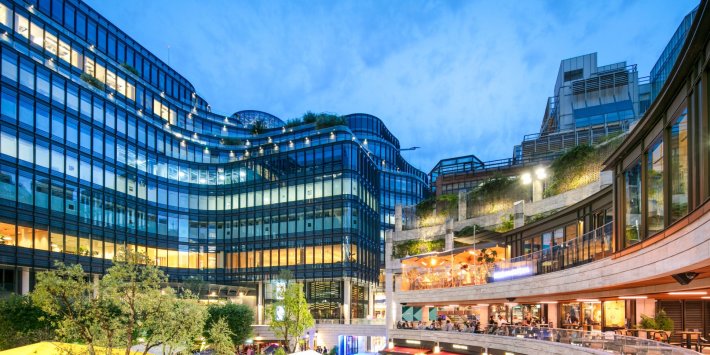
100 Liverpool Street is British Lands’ first Net Zero development
Omicron, the cost of living and COP 26 are now fading from the headlines. It would be easy for business leaders as well as policy makers to forget about the UK’s net zero goal. However, 40% of global carbon emission is attributed to the property sector. We must work together to reduce these emissions.
At British Land we’ve come a long way, reducing our carbon intensity by 73% over the last ten years and have committed to making our whole portfolio net zero by 2030, but there is still so much more that we can do.
The good news is that there is increasing demand for sustainable real property, from those who rent our office space to those who occupy our retail spaces. They are more inclined to choose buildings that reduce their carbon footprint and have a positive effect on their employees.
This will not be enough to drive rapid change. We need a clear policy that reduces emissions from the construction and operation all buildings. This is why we suggest five simple levers that policy makers could pull at minimal or no cost to accelerate decarbonisation.
First, the government can encourage the adoption of sustainable building materials, including the safe use in commercial buildings of timber, by investing in research to demonstrate the strength, safety, and energy performance of various materials. This would stimulate innovation in supply chains, and support the development standardised, insured systems that are backed by clear, consistent guidance.
Second, the Building Regulations could also be updated to regulate embodied Carbon Emissions, include mandatory reporting, and establish minimum performance standards for building construction.
We need a clear policy that reduces emissions from the construction and operation all buildings.
Third, we want to see mandatory energy performance data sharing between larger occupiers and property owners, in order to allow accurate reporting of total energy use. To improve performance, greater collaboration is essential.
Fourth, the planning system can be used to encourage the use Power Purchase Agreements between property owner and renewable energy generators. These agreements are specifically certified to increase renewable energy supply to the grid instead of using existing capacity.
To support this transition, we need green skills in every industry and sector. Further devolution of Adult Educational Budgets would enable the workforce to acquire the green skills that local industries and businesses need to reach net zero and drive economic development.
Off-site manufacturing, for example, can play a significant role in reducing the carbon footprint of new developments as well as addressing traditional skills shortages. These opportunities would be made available to the workforce through local skills programs, which would also support the growth of the industry in areas with strong manufacturing traditions.
As consumers continue to feel the effects of rising inflation, and the domestic energy transition taking place slowly, business has a tremendous opportunity and responsibility to lead.
British Land works with and learns from its supply chain to improve our buildings. We adopt best practices and share our lessons learned with other industry professionals to raise standards and accelerate the transition towards net zero.
I’m also confident that we can do more with the right policy environment and regulatory environment. The five suggestions here can help drive collaboration and innovation that net zero requires. With buildings accounting for a significant proportion of the nation’s carbon emissions, these are simple but powerful levers for government to pull.
Simon Carter is the Chief Executive Officer at British Land, a FTSE 100-listed property company.
PoliticsHome Newsletters
Get the inside scoop on MPs and Peers’ conversations. Register for The House’s morning emails to get the latest insights from policy-makers, parliamentarians and other organizations.
![]()
